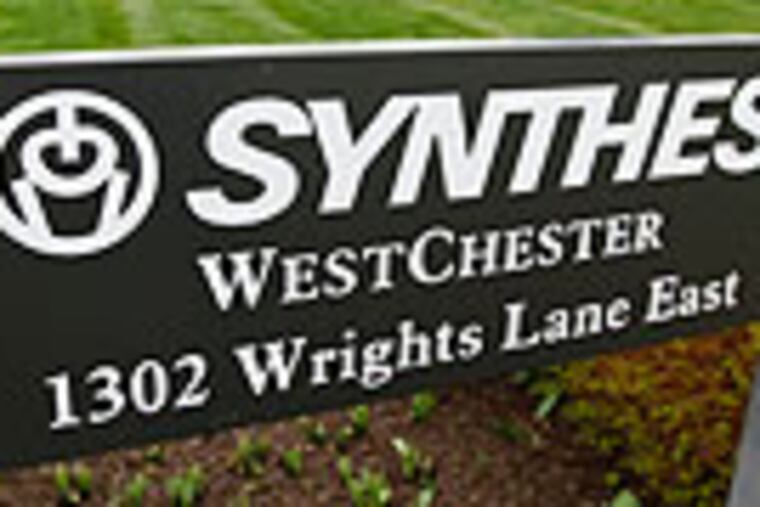Synthes' deal with Kensey Nash seems OK with feds
Without saying they approve or disapprove of such deals, the federal officials supervising the Synthes Inc. divestiture of its Norian subsidiary's assets have indicated - sort of - that Tuesday's $22 million sale to Exton-based Kensey Nash is acceptable.

Without saying they approve or disapprove of such deals, the federal officials supervising the Synthes Inc. divestiture of its Norian subsidiary's assets have indicated - sort of - that Tuesday's $22 million sale to Exton-based Kensey Nash is acceptable.
Synthes, the medical-device manufacturer near West Chester, had to shed its Norian assets as part of a plea bargain to settle criminal charges that it ran an illegal test market of the subsidiary's bone cement from 2002 to 2004.
Versions of that bone cement, other products, and a manufacturing facility will shift to Kensey Nash. The $22 million that Synthes gets from Kensey Nash is about $1 million less than it paid in fines to the government.
"The Department of Health and Human Services' Office of Inspector General does not contemplate approving or disapproving of any specific deal," office spokesman Donald White said Wednesday. "Before this was closed, the OIG received and reviewed information about it and had discussions with Synthes and Kensey Nash. We asked for and expect to receive further information as the sale is finalized, but we haven't gotten all of those final details."
Being neighbors, Kensey Nash and Synthes joined forces to solve each other's problems. Kensey Nash wanted more profitable products and a chance to have them sold by larger sales forces. Synthes needed to satisfy the feds.
"This was a transaction, obviously, reviewed by OIG and both parties," Kensey Nash chief executive Joseph W. Kaufmann said on a conference call with stock market analysts.
"The divestiture obligation is fulfilled," Synthes spokeswoman Gilgian Eisner said in an e-mail. "Other obligations, like the Corporate Integrity Agreement, are still ongoing."
Theoretically, Synthes will continue to profit indirectly from its bone cement and related products because it has a supply and research-and-development deal with Kensey Nash.
"The purpose of the divestiture agreement . . . was for Synthes to divest the Norian assets and operation to an unrelated third party," OIG's White said when asked whether the continuing business relationship was permissible. "The divestiture agreement does not bar the new owner from having commercial relations with Synthes. The Kensey Nash supply and research-and-development agreement may - and I said 'may' - be fine with the terms of the divestiture agreement."
Kaufmann said the deal would be great for Kensey Nash, which will transfer production of the Norian items and some Synthes employees to its facilities during the next 18 to 24 months.
He said he expected revenue in core biomaterials, which will include the bone cement, to increase from $32 million in fiscal 2011 to $42 million in fiscal 2012.
When Johnson & Johnson completes its takeover of Synthes, Kaufmann said, he hopes it will retain the agreements with Kensey Nash because it means "potentially thousands of new sales reps worldwide" for his company's products. Kensey Nash has about 250 employees now.
"Kensey Nash is well-positioned," Kaufmann said, "to have a great opportunity for strong growth in fiscal year 2012."